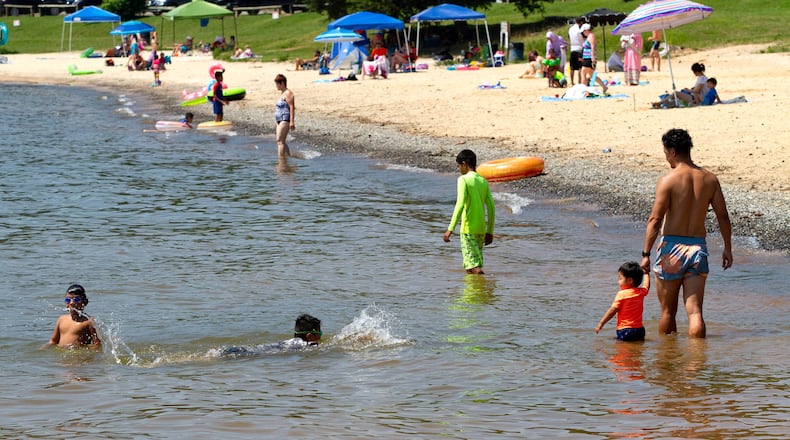The Labor Day weekend is a popular time to hit the road for a little getaway. But in the throes of a pandemic, many people are reconsidering their approach to summer’s last hurrah.
Infection rates have been trending down slightly in Georgia, but other holidays this summer have fueled surges in coronavirus cases. Public health officials say we are at a critical crossroads in the fight against COVID-19 and shouldn’t let our guard down.
“The COVID epidemic to me is like a wildfire: if the conditions are right, it can flare up even when you think you have it under control,” said Dr. Henry Wu, director of Emory TravelWell Center and associate professor at Emory University School of Medicine.
And large numbers of people traveling or flocking together closely at a beach, a lake, or anywhere for that matter are just the kind of activities which can lead to a spike in cases.
“Yes, we are concerned,” said Wu.
If you do decide to get out this long weekend or any other time during the coming months, experts urge advance planning and taking many, many steps to protect yourself and others from COVID-19.
Wu, who is also the director of Emory’s COVID-19 outpatient clinic, made the following recommendations:
Credit: Georgia Museum of Art
Credit: Georgia Museum of Art
Don’t forget the basics
If you are feeling sick or have been in close contact with someone with COVID-19 stay home. Even those with mild illness or who are asymptomatic can spread the virus to others. Wear a mask when you are around other people. Make sure to wear it correctly (covering your mouth, nose and chin). It’s also important to maintain your distance from other people even outside. And while we all know about the six-foot rule, Wu suggested people take it one step further: “Redefine what you consider what is your personal space when you’re out and about.”
Plan and think ahead
Make sure you pack hand sanitizer and have your masks — and make sure to have them within reach. Also, pack water and snacks to minimize stops. If you do have to stop for food or gas (or to use a public restroom), make sure to wear a mask and observe hand hygiene by sanitizing often. Also, try to maintain social distancing.
Take the time to research your travel destination. Some countries, and even other states, are doing temperature checks and requiring mandatory quarantines.
Decide whether your trip is worth the risks
With the risk of catching and spreading COVID-19 still high around the globe, Wu said the threshold for travel “should be a bit higher” than normal times, especially for older people and those in high-risk categories. Those with family members in high-risk categories and/or visiting people at an increased risk of severe illness from COVID-19 should also seriously reconsider their travel plans.
A recent survey found that only 33% of Americans have traveled for leisure or vacation since March, and only 38% say they are likely to do so by the end of the year, according to a recent report by the American Hotel and Lodging Association (AHLA). Usually, 70% of Americans take a vacation in any given year, suggesting that leisure travel is a long way from pre-COVID-19 levels.
Credit: Associated Press
Credit: Associated Press
Keep your distance at hotels, planes, and restaurants
Hotels, planes and restaurants are all taking precautions to help protect travelers. But the same basic precautions of wearing a mask and keeping a distance from others apply here too. At hotels, Wu said, “I would want to make sure to keep a distance from people so dangerous spots could be the lobby or elevators.” Wiping down high-touch areas in a hotel is likely a good idea, he said, and it’s best to avoid staying in a room or house rental immediately after the previous guests. You can ask hotels and rental management companies about their COVID-19 safety precautions.
When it comes to flying, Wu said try to sit away from other passengers if possible. Again, make sure to wear a mask and only remove it when necessary such as if you have to eat or drink. The good news, he said, is air circulation and filtration systems on airplanes are good, “so my main concern is those who are immediately around you.”
And when it comes to restaurants avoid eating inside, especially a crowded restaurant. Opt for takeout or eat outside on a patio.
“When I go to a restaurant if I see staff not wearing masks or they are hanging down their faces, I turn around and leave and look for somewhere else to go,” said Wu.
Get a flu shot
Wu says the flu shot is always recommended as a travel vaccine since the flu is one of the most common infections people get when traveling. But this year it is especially important. The symptoms of COVID-19 and the flu can be very similar.
“Imagine landing in another country with a high fever and cough and you could end up getting isolated and undergo mandatory testing and it could cause you and your family and the people you are visiting a lot of worry.”
About the Author
Keep Reading
The Latest
Featured





